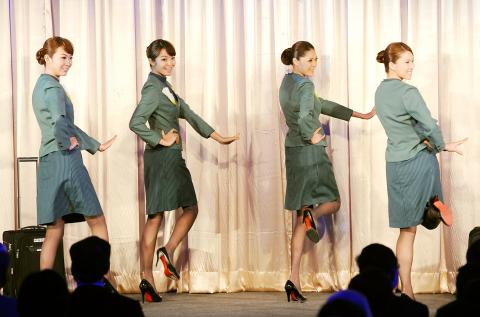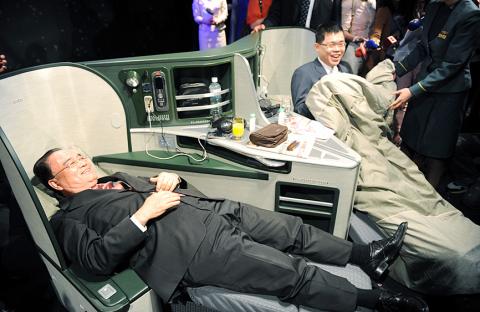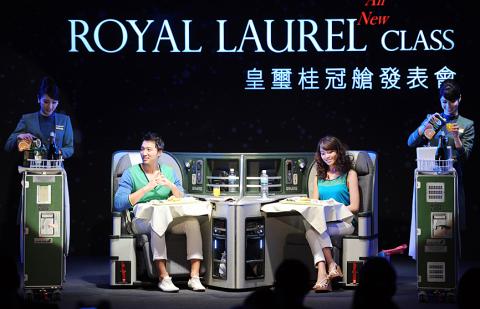EVA Airways Corp (EVA, 長榮航空) yesterday announced plans to spend US$100 million to upgrade the business class on its 15 Boeing 777-300ER aircraft, in the hope that a focus on premium customers will help to increase revenue.
EVA, the nation’s second-largest carrier, will complete the upgrade by August next year, with first plane to be finished by the end of this month set to start operating on the Taipei-New York route from June 2.
“Faced with tougher economy-class service competition, the company is looking to attract more premium customers through the upgrade,” EVA president Chang Kuo-wei (張國煒) told a media briefing.

Photo: Lo Pei-der, Taipei Times
Chang said the rise of budget airlines had made it increasingly difficult for carriers to focus solely on economy class, which was why EVA had decided to follow Cathay Pacific Airways and Singapore Airlines by targeting business-class customers.
To achieve this goal, EVA would reduce the number of business-class seats, but could increase the price by up to 20 percent, further helping increase company revenue, Chang said.
While market observers remain downbeat about the prospects of the airline sector this year, Chang said it was always good to invest more when economic sentiment was close to the bottom because of lower costs.

Photo: Lo Pei-der, Taipei Times
Meanwhile, Chang said he expected the company’s revenue to improve in the second quarter from the first quarter on the back of higher cargo sales led by stable freight rate and volume.
However, the carrier’s performance during the July-to--September period, the peak season for passenger demand, would remain the most important driver for the company this year, he added
In addition, rising crude oil prices continue to increase cost pressure and affect the company’s profitability, he said.

Photo: Lo Pei-der, Taipei Times
“Actually, we are likely to improve our sales performance this year,” Chang said. “The only downside is that all our hard work is -going to benefit the oil companies.”
However, EVA had no plans to buy an oil refiner like Delta Air Lines Inc did, as the company does not have the necessary expertise to run an oil refining -company, Chang said.
EVA reported NT$1.08 billion (US$36.9 million), or NT$0.33 per share, in net losses for the first quarter of the year, compared with profits of NT$269.32 million, or NT$0.08 per share, a year earlier, Taiwan Stock Exchange (TWSE) data showed.
However, revenue for the company totaled NT$25.57 billion in the January-to-March period, up 5.7 percent from the previous year, statistics showed.
EVA’s shares fell 0.28 percent to close at NT$17.95 on the TAIEX yesterday, stock exchange data showed.

With an approval rating of just two percent, Peruvian President Dina Boluarte might be the world’s most unpopular leader, according to pollsters. Protests greeted her rise to power 29 months ago, and have marked her entire term — joined by assorted scandals, investigations, controversies and a surge in gang violence. The 63-year-old is the target of a dozen probes, including for her alleged failure to declare gifts of luxury jewels and watches, a scandal inevitably dubbed “Rolexgate.” She is also under the microscope for a two-week undeclared absence for nose surgery — which she insists was medical, not cosmetic — and is

CAUTIOUS RECOVERY: While the manufacturing sector returned to growth amid the US-China trade truce, firms remain wary as uncertainty clouds the outlook, the CIER said The local manufacturing sector returned to expansion last month, as the official purchasing managers’ index (PMI) rose 2.1 points to 51.0, driven by a temporary easing in US-China trade tensions, the Chung-Hua Institution for Economic Research (CIER, 中華經濟研究院) said yesterday. The PMI gauges the health of the manufacturing industry, with readings above 50 indicating expansion and those below 50 signaling contraction. “Firms are not as pessimistic as they were in April, but they remain far from optimistic,” CIER president Lien Hsien-ming (連賢明) said at a news conference. The full impact of US tariff decisions is unlikely to become clear until later this month

GROWING CONCERN: Some senior Trump administration officials opposed the UAE expansion over fears that another TSMC project could jeopardize its US investment Taiwan Semiconductor Manufacturing Co (TSMC, 台積電) is evaluating building an advanced production facility in the United Arab Emirates (UAE) and has discussed the possibility with officials in US President Donald Trump’s administration, people familiar with the matter said, in a potentially major bet on the Middle East that would only come to fruition with Washington’s approval. The company has had multiple meetings in the past few months with US Special Envoy to the Middle East Steve Witkoff and officials from MGX, an influential investment vehicle overseen by the UAE president’s brother, the people said. The conversations are a continuation of talks that

CHIP DUTIES: TSMC said it voiced its concerns to Washington about tariffs, telling the US commerce department that it wants ‘fair treatment’ to protect its competitiveness Taiwan Semiconductor Manufacturing Co (TSMC, 台積電) yesterday reiterated robust business prospects for this year as strong artificial intelligence (AI) chip demand from Nvidia Corp and other customers would absorb the impacts of US tariffs. “The impact of tariffs would be indirect, as the custom tax is the importers’ responsibility, not the exporters,” TSMC chairman and chief executive officer C.C. Wei (魏哲家) said at the chipmaker’s annual shareholders’ meeting in Hsinchu City. TSMC’s business could be affected if people become reluctant to buy electronics due to inflated prices, Wei said. In addition, the chipmaker has voiced its concern to the US Department of Commerce